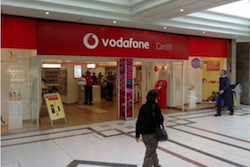Building mobile networks in the UK is being held back by “out of date” planning laws and a lack of fibre in rural areas, a Vodafone network executive has claimed.
The operator has recently brought 2G, 3G and 4G mobile connectivity to the Isle of Coll, which lies off the coast of Scotland and is home to 200 people.
The Scottish government paid for the mast and the communication links back to the network. Microwave beams are used to send signals instead of fibre.
In a post on Vodafone’s blog, Networks Manager John McCracken said the project took a year to set up. He criticised the amount of time operators need to spend on network projects.
He said: “Like all infrastructure building mobile networks takes longer in the UK than is should often due to out of date planning and property laws and the lack of a BT fibre network in rural areas which we need to use to connect the mast to the rest of our network.
“One issue we didn’t face was a problem finding a site to build the mast or agreeing a reasonable rent with the landlord. This is a major problem up and down the country but not on Coll where the local community have been brilliant by working with us to find a solution.”
Vodafone also announced this morning that it had brought 4G to its 500th community. Pontypridd in Wales had its LTE signal switched on as part of a wider £1 billion project to improve coverage across the United Kingdom.
Read more:



